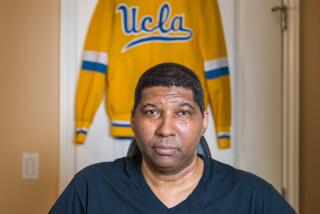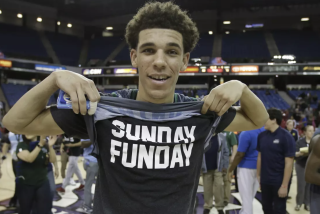Irvine’s Shipp Working His Way Back Slowly, but Surely : Basketball: Anteater is back on campus taking classes after car accident. Now he’s shooting to get back on court.
IRVINE — Tchaka Shipp and Kevin Simmons were asleep when the nightmare began, Simmons in the passenger seat, Shipp behind the wheel. The rented convertible hit the median, then a tree, flipped upside down and slid 200 feet down the street.
Rod Baker was asleep on that July 19, 1994 night, when he got the call, the call a coach never wants to get.
“As I drove up to the scene of the accident,” said Baker, UC Irvine’s basketball coach, “the ambulance was just leaving to take Tchaka away. Kevin was sitting on the curb and I could see that he was dazed and cut up, but he was alive anyway.
“So I asked this officer, ‘How’s the guy they just took away?’ And he said, ‘Worry about the guy you’ve got here, Coach. I don’t think the other one is going to make it.”
Shipp’s head had repeatedly rebounded off the pavement as the overturned convertible’s roof disintegrated. And there were a few desperate moments when his heart stopped beating on the way to the hospital.
“I woke up and the car was upside down,” said Simmons, a freshman forward who was released from the hospital the same day after treatment for cuts and bruises. “All the windows were broke and I crawled out. I tried to open Tchaka’s door, but it was stuck. He was looking in really bad shape.”
For nine days, Shipp was in a coma in Santa Ana’s Western Medical Center after undergoing surgery because of a badly bruised and swollen brain, torn ligaments and muscles above his left knee and a severed tendon and compound fracture of his right index finger. He also had some broken bones in his face and had lost four teeth, part of his lip and most of the flesh on the back of his right hand.
Shipp, a transfer from Seton Hall, had been in Irvine only two weeks when he and fellow Brooklyn native Simmons went to watch Simmons’ former AAU team play a game in Torrance with NBA players Terry Dehere and Malik Sealy. After the game, the four went to dinner and then Sealy let Shipp borrow his rented Chrysler LeBaron.
Simmons quickly went to sleep. And about 2 a.m., just a few blocks short of where they were staying in Irvine, Shipp drifted off, too.
When Shipp’s mother, Annette, arrived at the hospital the next day, her son was almost unrecognizable.
“Tchaka is our light,” she told Newsday. “ . . . When the light was going out, we all felt the dimness.”
*
Charcoal-gray clouds swirled past and rain pelted against the windows behind his head, but there is no gloom in Tchaka Shipp’s world these days.
Simply, he’s happy to be alive and back in time for the winter quarter, which began Friday.
He doesn’t remember much of his ordeal--not the intensive care unit, not the post-operative pain, or even some of the rehabilitation--so he’s still coming to grips with his brush with death.
“I remember the game and kind of remember going out to eat, but I don’t remember getting in the car,” he said. “After that, I remember waking up in my hospital room one day and going downstairs for therapy. I don’t really remember much pain, but my mother said I was in a lot of pain. She said they’d give me a shot of morphine and I’d be straight for a couple of hours.
“I remember I went into the bathroom and saw I didn’t have any teeth. I asked my mother ‘Where my teeth?’ She said, ‘They came out in the accident.’ I said, ‘What accident?’
“The first time it really hit me how bad it was was in (an Anaheim) rehab center. The cognitive therapist had me read my medical report to her. It said, ‘No pulse. No heartbeat.’ It was like, ‘So, what am I doing here?’ ”
The orange-sized lump on his brain had receded, but it left Shipp with a slowly dissipating amnesia. With prodding from his mother, sister, Tracy, and frequent visitor Dehere, the pieces of his life began to fall in place.
“My memory came back in tiny, little fragments,” he said. “I had everything jarred up. First, I thought Kev was hurt really bad too, and he was in the hospital with me. And I kept connecting California to New York. I’d tell Terry, ‘When I get out of here, I’m going up two blocks and get on the (subway) to go home.’ Like I knew exactly where the station was.
“Finally, Terry brought me a big map. He marked off where we are in California and then he marked off where New York was and I finally realized I was just bugging out.”
While in the Anaheim facility, Shipp slipped out back where a basketball hoop and backboard stood. His right index finger was rigid and stuck straight out. His left leg was wobbly. But he managed a few shots. And he made sure the first one went in.
“I could hold the ball and my wrist was fine, so I could shoot,” he said, smiling. “Oh yeah, everything was going in.
“I still don’t think about how bad it was, you know what I’m saying? All I think about now is how to get back, not just back to where I was, but better.”
*
When Baker arrived at the hospital, he didn’t know what to expect. After an orthopedic surgeon emerged from surgery to give Baker a report and included his opinion of Shipp’s chances of playing again, the Irvine coach was somewhat relieved.
“Obviously, if that’s part of the conversation then the other thing is not the issue anymore,” Baker said. “And I’d seen Tchaka before surgery and I definitely thought it was still an issue then.”
Now, Baker is so glad to see Shipp, he’s not even daydreaming about seeing him in uniform.
“The doctors in New York have said he’s ready to come back and take a shot at school,” Baker said. “I’m very, very happy he’s alive. And then I’m very, very happy he’s able to come back to school and do the things a normal 20-year-old should be able to do. After that, I don’t really care.
“I mean Tchaka came here as a big strapping, strong young man, ready to take on the world from a basketball standpoint. I’m sure to lose that would have to bother him. But the rehab part from a basketball standpoint is going to take a long time. Yeah, he wants to play and do well and all that. Great. But he’s back and let’s rejoice in that.”
For Shipp, being a student is good, but being a student-athlete is the goal. He was a promising, 6-foot-8, 240-pounder who had two up-and-down seasons at Seton Hall and a mostly down relationship with former Coach P.J. Carlesimo that ended in his decision to transfer. As a sophomore, he played in every game, averaging three points, three rebounds and 13 minutes.
He has lost 25 pounds, almost all of it muscle mass, and can’t regain it currently because his hand injury keeps him from lifting weights. But Shipp knows he once could compete in one of the toughest Division I conferences in the country and he’s positive he will be able to play in the Big West one day.
“Sure, there are thoughts like, ‘What if my hand won’t do what I want it to?’ But most of the time I look over that,” he said. “Where I’m from in Brooklyn, you don’t grow up doubting yourself. It’s always been hard for me to say, ‘I can’t.’
“Yeah, I’ll be back. Rehabbing my leg hasn’t been bad at all. It’s been a chance to work out and I’m used to that. I’m not worried at all about my knee. I was out in the park (in New York) the other day and I can still dunk. It was easy and I don’t have much muscle in my legs now, either.”
Shipp gingerly holds up his injured right hand, points to the bandage over his knuckles and grimaces. A tendon in the index finger was severed and surgically reattached with a screw.
“This is the only thing holding me back,” he said. “And this is the most pain I’ve felt since I’ve been up from my sleep. There was no skin, just bones and muscle here and they just did another surgery to remove scar tissue.
“It’s tightening up now and to move it or bend it . . . wow. “
But Shipp is convinced the accident and his recovery have provided him with a determination that will allow him to battle through the pain and frustration and eventually revive his basketball career.
“I always used to tell the trainer to never let up on me when I was working out, to keep me from being lazy,” he said. “I’ve never looked at this whole thing like it was a miracle, but I do think it will be a motivator. I’ve discovered that from rehabbing. It’s a push I’ve got when I want to stop.”
More to Read
Go beyond the scoreboard
Get the latest on L.A.'s teams in the daily Sports Report newsletter.
You may occasionally receive promotional content from the Los Angeles Times.










